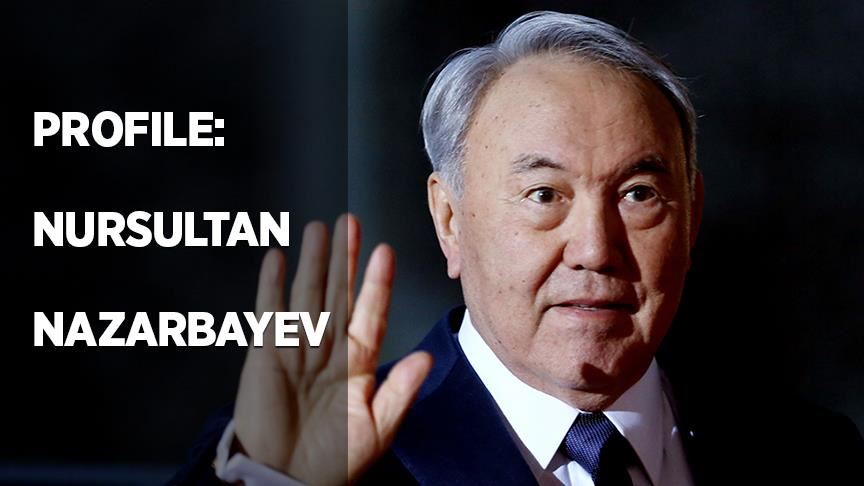PROFILE - Nursultan Nazarbayev: First president of Kazakhstan
Nazarbayev resigned on Tuesday after almost three decades in office

ANKARA
Kazakhstan’s first President Nursultan Nazarbayev Tuesday resigned after almost three decades in office.
"I have decided to step down from the office of president," said the septuagenarian leader, who has ruled Kazakhstan since its independence in 1991, in an address which was broadcast by all Kazakh national TV channels.
Until elections for his replacement, Kassym-Zhomart Tokayev, the head of the Kazakh Senate, will carry out the presidential duties.
Nazarbayev, 78, is the first Central Asian leader of the post-Soviet era to willingly leave office.
In late February, Nazarbayev dismissed the country's government, citing a lack of economic growth, and pledging new reforms to improve people's quality of life.
Early life
Nazarbayev was born on July 6, 1940 in Chemolgan village into a labor family, who later adopted a nomadic life style until World War II.
The family returned to the village after the end of the war and he started to learn Russian language, while he also performed well at school.
At an early age of 20, “the young metallurgist Nazarbayev together with experienced craftsmen took part in first Kazakhstan iron smelting [the Karaganda Metallurgical Plant],” according to the official webpage of Nazarbayev.
Successfully achieving heavy duties, due to working conditions under extreme heat and tension, at the blast furnace, Nazarbayev became one of the “highly skilled metallurgists.”
Political life
“His [Nazarbayev’s] desire always to be the leader, the ability to inspire people and lead them have been noticed and appreciated,” according to the website.
In 1969, Nazarbayev started to work in the party.
“His appointment in 1972 as a Secretary of the Party Committee of the native Karaganda Metallurgical Plant was the turning point,” it said.
In 1977, he became the second secretary of the Karaganda Regional Party Committee and two years later Nazarbayev became secretary of the Central Committee of Communist Party of Kazakhstan.
“In 1984 he became Chairman of the Council of Ministers of Kazakh SSR,” the website said.
Five years later, Nazarbayev was named party leader, the second Kazakh holding the post for the Central Committee of the Communist Party of the Kazakh SSR.
In 1990, he was elected first president of Kazakhstan by the Supreme Soviet.
In 1991, Kazakhstan declared independence upon Soviet Union’s disintegration and Nazarbayev became the first president of the Republic of Kazakhstan with a 98.7 percent support from the voters.
Presidency
Nazarbayev’s first step as the president was to shut down the Soviet nuclear test site Semei, and turn the country into a peace center.
One of concrete steps of Nazarbayev -- who aimed to establish an independent state after the collapse of the Soviets, and to transit from a planned economy to a market economy and from a totalitarian regime to democracy -- was a decision to move the capital of the country from Almati to Astana -- then-Akmola -- in 1997.
Kazakhstan also actively participated in activities of regional integration and international institutions under the leadership of Nazarbayev.
The country was elected temporary member of the UN Security Council in 2017-2018, and it proposed some suggestions for resolving disputes in peaceful ways.
The country achieved a 15 times economic growth during Nazarbayev’s three decades in the office. Income per capita increased nine times and the country was listed in the most-developed 50 countries.
Kazakhstan has transformed into an intercontinental transit center thanks to transit and logistics infrastructure investments, while the number of population living on the poverty line in the years of independence has decreased by 15 times.
Thanks to the reforms made to improve the business and investment environment in the country, Kazakhstan, which attracted a total of $300 billion of foreign investment, became the leading country in Central Asia.
Nazarbayev’s term of office was extended till 2000 with a referendum held in 1995. He was elected president for a second time with 91.15 percent of the votes in 2005 election.
He was again given the seat by the people with increased vote of 95.55 percent in the 2011 election.
Nazarbayev won the last election held in 2015 with 97.75 percent of votes. His term of office was due to expire in 2020.
Even though he resigned from the office, Nazarbayev will continue to serve as president of the National Security Council, as the president of the ruling party, Nur Otan, and as a member of the Constitutional Council.
*Aliia Raimbekova contributed to this report from Astana.
Anadolu Agency website contains only a portion of the news stories offered to subscribers in the AA News Broadcasting System (HAS), and in summarized form. Please contact us for subscription options.

